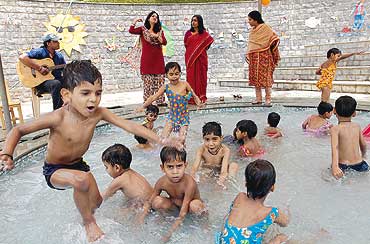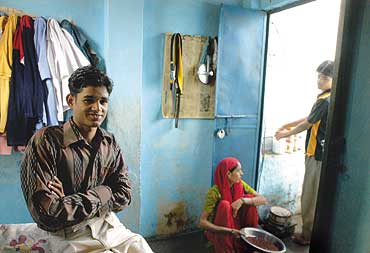Sudama's childrenThis article talks about the implementation of a Delhi High Court order in 1994 legislating that private schools need to take in 1 poor child out of every 5 children they admit.
Last year, Chandrama, who lives in a slum colony behind Sanskriti called Sanjay Gandhi Basti, got his daughter Pratibha into the elite school on Delhi’s embassy row, packed with the kids of bureaucrats, politicians and professionals.
As their peppy six-year old, who has just graduated from nursery to prep, takes us through Red Riding Hood, in Hindi spiked with English, her parents listen, rapt. "In just one year, it’s all changed, the way she walks, talks, eats," says her mother Munni, who collects water in jerrycans for Pratibha’s morning bath, pays an istriwallah to iron her uniform every day and keeps a glossy stack of Parents’ Day pictures in her jhuggi Some of the adjustments the teachers have made to accomodate the children are quite interesting.
"It has been a sheer privilege, the most satisfying thing I’ve done in my career," says nursery teacher Prachi Behl, who sources swimsuits for her wards in Sarojini Nagar, translates report cards into Hindi, replaces mango shake with nimbupani in a home activity sheet (to avoid the use of blenders) and figures out how to explain jelly, jam and porridge to kids who have no idea what they are.Obviously the problems of different economic barriers do come up. But here is a success story of a springdales school graduate, Naveen Yadav.
Springdales alumnus Naveen Yadav, a 23-year-old who’s doing a degree in biotechnology at the Delhi School of Engineering, will end up being the only white-collar professional in his family. "Nobody from a government school can get where I can. It’s not just marks, but culture, knowledge, preparation for life," he says emphatically. "I’m not afraid to talk to the manager of a company."
Is it alienating, sometimes, to be so far ahead of his family? "No, it gives me a sense of responsibility. My sister’s and brother’s children will go to Springdales, I’ll make sure of that."
Another story here of a topper, in my boarding school, they admitted some scholarship students from the North East of India. And most of them did very well academically and socially.
Yogesh Kumar, son of a poor widow, who has topped Heritage School with 92.2 per cent in the cbse Class 12 exams despite the handicap of a relatively weak English score, joined the school in Class 11. "I would never have got these marks had I stayed on at my government school. I would not have been supported the way I have been here." Was it hard to change schools? "Yes," says Yogesh, who even dropped out briefly because he couldn’t handle the change but is glad he went back: "The same students who teased me for my English in Class 11, helped me in Class 12. Because they realised I was a good student.It helps if you are good at something." "Today, he is a hero and a role model for the whole school," says his principal, exulting over his result.


